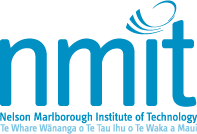Nelson Marlborough Institute of Technology
 | |
Academic staff | 243 FTE staff 2015[1] |
|---|---|
| Students | 3,179 EFTS (2015)[1] |
| Location | , 41°16′29″S 173°17′21″E / 41.2746°S 173.2891°E |
| Affiliations | Public NZ TEI |
| Website | www |
 | |
Nelson Marlborough Institute of Technology (NMIT) is a public tertiary education institution at the top of the South Island in New Zealand. NMIT's main campus is in Nelson with other campuses in Blenheim, Marlborough, Woodbourne and Richmond. It has been providing tertiary education in the Nelson-Marlborough region since 1904.[2] NMIT offers 100 programmes at certificate, diploma or degree level across a broad range of areas and has a yearly enrolment of around 3,000 equivalent full-time students,[3] locally, nationally and internationally.
Curriculum and programmes
[edit]NMIT is an NZQA approved Category 1 tertiary education provider[4] and ISO 9001 certified.
The region's economy includes New Zealand's largest concentration of fisheries, wine and aquaculture. It also has substantial forestry, horticulture, aviation, tourism and arts industries as well as a sizable conservation estate, including three national parks. NMIT has developed programmes that sustain the region's infrastructure as well as specialized programmes in niche areas.
NMIT's programmes include Viticulture, Aquaculture, Nursing, Maritime, Adventure Tourism, Creative Industries, Business and Computing. It also delivers a wide range of trade qualifications.
History
[edit]Nelson Marlborough Institute of Technology (NMIT) originated from the Nelson Technical School founded in 1905.[5] Initially offering courses in various disciplines including cookery, engineering, and commerce. NMIT expanded its operations into Marlborough in the 1980s, establishing the Ballinger Horticulture Centre and later developing campuses in Richmond and Nelson.[5] By 1992, NMIT began offering degree-level education, enhancing its focus on local industries such as horticulture, forestry, and viticulture. The institution's growth resulted in its renaming to Nelson Marlborough Institute of Technology in 2000, to reflect its regional influence.[5] Today, NMIT remains a pivotal educational institution, offering a diverse range of over 100 qualifications from certificates to master's degrees, with specialties in aquaculture, maritime, viticulture, wine, and aviation engineering.[5]
On 1 April 2020, NMIT was subsumed into New Zealand Institute of Skills & Technology alongside the 15 other Institutes of Technology and Polytechnics (ITPs).[6]
In mid-July 2025, the Vocational Education Minister Penny Simmonds announced that the Government would return NMIT and nine other polytechnics to regional governance by 1 January 2026.[7][8]
References
[edit]- ^ a b "NMIT Annual Report" (PDF). 2015. p. 13. Retrieved 31 March 2017.
- ^ "Nelson Marlborough Institute of Technology". Nelson City Council. Archived from the original on 22 May 2010. Retrieved 16 May 2010.
- ^ "Maritime Programmes". edumaritime.com. Retrieved 17 September 2015.
- ^ "NZQA". NZQA. Retrieved 17 April 2015.
- ^ a b c d "Our history". Nelson Marlborough Institute of Technology. Retrieved 20 June 2024.
- ^ Kenny, Lee (29 October 2019). "Wanted: 'Sophisticated' leader to head NZ's mega polytech". Stuff. Retrieved 7 March 2020.
- ^ "Te Pūkenga: Government restores regional governance for 10 polytechnics, unwinds merger". The New Zealand Herald. 14 July 2025. Archived from the original on 16 July 2025. Retrieved 16 July 2025.
- ^ Simmonds, Penny (14 July 2025). "Regional governance will return to ten polytechnics". Beehive.govt.nz. New Zealand Government. Archived from the original on 15 July 2025. Retrieved 16 July 2025.
External links
[edit]
